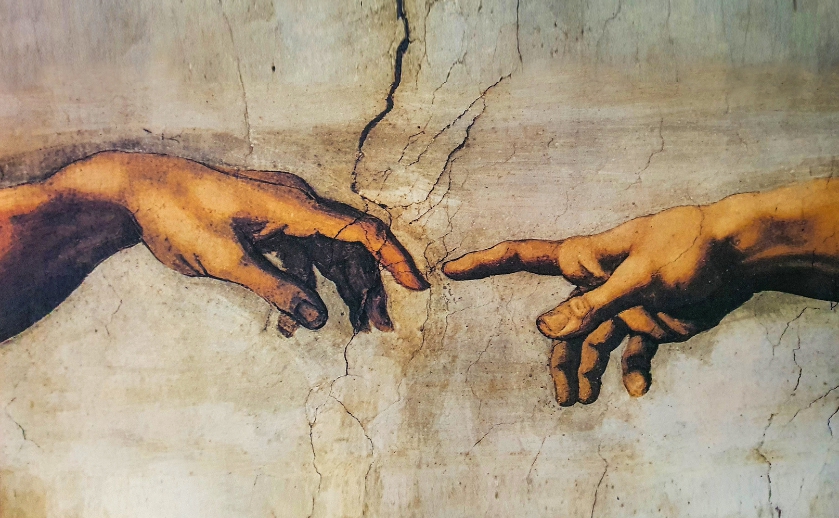The views expressed in our content reflect individual perspectives and do not represent the authoritative views of the Baha'i Faith.
Belief or disbelief in God has become a point of contention among Americans, and it’s leading to prejudice and disunity. According to a survey by Pew Research Center, around 3%of Americans call themselves atheists. Another 9% say that they do not believe in God or a universal spirit. But can we define terms? What “God” are we referring to?
Are we referring to the Biblical God who literally created the world in seven days? Or the God Michelangelo painted on the ceiling of the Sistine Chapel, with flowing white hair and a beard? I don’t believe in that God either.
University of Kentucky psychologists Will Gervais and Maxine Najle conducted a study on atheism and found that most people (even other atheists!) believe atheists are less moral than people who believe in God. “We’ll give participants a little vignette, a story about someone doing something immoral, and probe their intuition about who they think the perpetrator was,” Gervais said in an interview. “And time and time again, people intuitively assume whoever is out there doing immoral stuff doesn’t believe in God.”
Atheism is not an organization (although it might be thought of as a non-Prophet organization!), and there are as many kinds of atheists as there are theists. Believing in God doesn’t automatically make me a better person.
Baha’is do believe in God — just about all of our prayers begin with an invocation of God — but the Baha’i Writings clearly tell us that we “must endeavour to consort in a friendly spirit with everyone, must follow moderation in their conduct, must have respect and consideration one for another and show loving-kindness and tender regard to all the peoples of the world.” The Baha’i Writings also explain one of the main tenets of the Baha’i Faith, expounded by its prophet and founder, Baha’u’llah: “Baha’u’llah continually urges man to free himself from the superstitions and traditions of the past and become an investigator of reality.”
As an “investigator of reality,” I can’t simply agree or disagree on the existence of God without further thought. I prefer to build bridges and find points of agreement, so I learn from others’ truths as I hope they learn from mine.
Everyone has their own reasons for why they profess atheism, but here are some of the most common ones I’ve found — and as a Baha’i, I’ve actually found I agree with them:
Religion Often Controls People
Many reject organized religion because they see the bad influence clergy has had over the general population throughout history, and therefore reject said religion’s teachings — including that of the existence of God.
That’s why the Baha’i Faith takes the added step of abolishing clergy, and demands that faith be based on conscious knowledge, not blind imitation. Abdu’l-Baha, the son of Baha’u’llah wrote: “He must not be an imitator or blind follower of any soul. He must not rely implicitly upon the opinion of any man without investigation; nay, each soul must seek intelligently and independently, arriving at a real conclusion and bound only by that reality.”
This way, we can avoid the power imbalances that often arise when some people are put “in charge” of others’ spirituality, and encourage everyone to investigate the truth independently.
Organized Religion Is Often Hypocritical
Others reject the concept of God because they have seen evidence of hypocrisy among the followers of organized religion.
Abdu’l-Baha said: “Divine religion is not a cause for discord and disagreement. If religion becomes the source of antagonism and strife, the absence of religion is to be preferred. Religion is meant to be the quickening life of the body politic; if it be the cause of death to humanity, its nonexistence would be a blessing and benefit to man.”
Abdu’l-Baha agrees: No religion is preferable to bad religion!
(But also, don’t judge a religion by its followers only — we’re all trying to be better people, but no one is infallible.)
Science Does Not Support the Existence of God
Another common belief is that religion is superior to science. The Baha’i writings liken religion and science to two wings, both of which are required if humanity is to progress. In a talk in Paris in 1911, Abdu’l-Baha said: “Should a man try to fly with the wing of religion alone he would quickly fall into the quagmire of superstition, while on the other hand, with the wing of science alone he would also make no progress, but fall into the despairing slough of materialism.”
He went on to note that “all religions of the present day have fallen into superstitious practices, out of harmony alike with the true principles of the teaching they represent and with the scientific discoveries of the time.”
Religion without science is superstition, science without religion is materialism. We can see a lot of both in today’s world. Is it possible to believe in God, while also believing in the wealth of scientific knowledge humanity has amassed over time?
Baha’is believe, as Abdu’l-Baha explained, that “all the divine Manifestations [prophets] have proclaimed the oneness of God.” But the Baha’i Writings also say that “That which we imagine, is not the Reality of God; He, the Unknowable, the Unthinkable, is far beyond the highest conception of man.”
Now do a little experiment with me. Hold up your right hand in front of your face. Can you see it? Can you feel it? Is it real? The answer is yes (provided we aren’t all part of some sinister plot where our electrochemical energy is being used to power an alien civilization — such as Neo in the Matrix!). Because my hand is in front of my face, I think I can confidently say that my hand exists. Therefore, I can understand this concept of “existence.”
But can you possibly conceive your hand “unknowable and unthinkable”? No. We can think only in terms of things that pertain to this physical world, and you and your hand exist because you are part of this physical world. Therefore, since God is, according to the Baha’i scriptures, beyond our highest conception and beyond singleness, is it not fair to say he is also exalted beyond existence?
I do not believe in a God, in terms of an existing being or force. The Baha’i Faith’s teachings, which do not tell me to worship a guy in the sky, remove clergy from the equation and encourage me to investigate the truth for myself. This has led me to believe in the God I’ve always believed in: one that is “beyond the highest conception of man.” An unquantifiable amount of mystery from which we occasionally get glimpses of insight is also a part of science.
The closest ability I have to understand God is to obey the guidance of my chosen religion, the Baha’i Faith, and follow its teachings to the best of my ability. I like to share these teachings with others because the Baha’i writings say: “If ye be aware of a certain truth, if ye possess a jewel, of which others are deprived, share it with them in a language of utmost kindliness and goodwill. If it be accepted, if it fulfill its purpose, your object is attained.”
But as Baha’u’llah also wrote, “If anyone should refuse it, leave him unto himself… Beware lest ye deal unkindly with him.” We don’t need to have the same beliefs to be friends, and we are more alike than we are different. Why should we fight?
Remembering Jeff Ramey, who passed away in Thailand in December 2020. His words live on, continuing to inspire hearts today.
















Comments
Sign in or create an account
Continue with Googleor